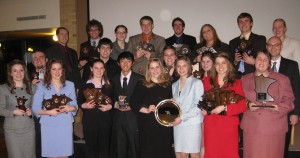
This Gustavus Forensic Team has earned three consecutive team state titles, won eight individual state titles in 2010, been ranked nationally in the top-20 for the past three seasons and has brought more than 500 high school students to campus in the past year for recruiting purposes. The organization has brought an endless string of hardware home to the hill competition after competition. Its 20 members have continued to make a splash recently. Kristofer Kracht, director of the forensics team, said that the team’s recent successes have “made the students begin to realize that it was really possible for us to succeed on a larger scale.”
The weekend of February 20 and 21, 2010, the forensics team competed in the 2010 Minnesota Collegiate Forensics Association (MCFA) State Tournament at Concordia College-Moorhead. Competing against eight other collegiate teams from Minnesota, Gustavus handily took first place by a margin of 117 points. In addition, the entire team was awarded the Greg Lapanta Quality Award, which is given to the team with the highest point total per event entered.
“What is most impressive is that we won eight of the 13 events that we participated in [individually], which is clearly a sign of our strength” Kracht said.
Senior History and Communication Studies Major Mary Cunningham took home three of those titles, Senior History and Religion Major Claire Sagstuen shared another individual title with Cunningham, Senior Physics Major C.J. Hunt placed first in two categories and Sophomore Biology Major Sam Hemmerich and First-year Eric Halvorson each took home a first-place title in their own events. Cunningham also won the Individual Sweepstakes award for the strongest showing by an individual competitor in the state, with Hunt and Junior Math Major Chloe Radcliffe finishing a close third and fourth, respectively.
State competitions are not the only level on which Forensics is gaining a reputation, however. Last April, the team made its strongest showing in school history on the national level at the American Forensics Association National Individual Events Tournament (AFA-NIET) by placing 18 out of 89 teams. “The best way to put this into context,” Kracht said, “is that fifteen of the top twenty teams are Division-I schools, and none of the other five [besides Gustavus] is D-III. We are only one of fourteen schools in the nation to be ranked in the top twenty consecutively for the past three years.”
In 2008 the team achieved twentieth place nationally, the same mark they reached in 2007. The Forensics Team hopes to better that mark at the 2010 AFA-NIET competition at the University of Wisconsin-Eau Claire in the first week of April. “Our goal this year [at AFA-NIET] is a top 15 finish, and we are willing to work for it,” Sagstuen said.
The manner in which forensics is organized is a bit different than most activities on campus. It is not considered a student organization or an athletic program. Instead, it is a co-curricular activity sponsored through the communication studies department that counts for a varying amount of academic credit based on student choice and credit load. However, the amount of credit only signifies one’s participation in the activity, not how many competitions or events in which the members compete. “[The credit] really has nothing to do with the amount of time and effort you are willing to put … into the team” Sagstuen said.
Funding of the program is also unique. Throughout the season (September-April), the team travels to eight states to compete in more than 20 weekend tournaments. As a result of the program’s co-curricular status, this travel is funded largely by the communication studies department. “[Forensics] doesn’t get any funding from the Student Senate budget … it’s been part of the department budget and always has been,” Kracht said.
The student members also make a coordinated effort to seek out additional funding from other sources. “Sometimes we will have fundraisers and whatnot to get some extra financial help, much of which we will dedicate to local charities,” junior history major Eric Cronin said.
A portion of the finances also comes from alumni and other donors. Cunningham mentioned that the team “has a possible matching funds opportunity through an alumnus” that has come to the team’s attention recently.
In order to be a part of the group, team members employ a “no-experience-necessary” attitude. “We are looking for kids who are willing to work hard and kids who are committed. Anything beyond that, we can teach you,” Kracht said.
“People should know that anyone can just come and join…take C.J Hunt, for example. All he had was a high school teacher who encouraged him to be part of the speech club, and now after joining Forensics, a few years later, he won two titles this year at state. It’s really impressive” Cronan said.
This is not to say that the team does not do some heavy recruiting. Each summer, forensics hosts the Summer Speech Institute that brings 80 to 90 high schoolers to Gustavus from six to eight states to learn about the program. They also will again be hosting the MSHSL State Speech Tournament in April, which will bring nearly 700 competitors and 1,300 observers to campus over a two-day period. The program also has a forensics scholarship that grants $1,000-2,000 annually to a new Gustie who commits to the forensics team. This year, there are twenty applicants for the scholarship.
Because of its dedication to academic excellence and community service, the Forensics team fits well into the culture of Gustavus. “Forensics epitomizes the liberal arts paradigm. There is nothing more ‘liberal arts’ here than our group,” Kracht said.
“You’re going to find people from pretty much every major on our team, and despite the time we commit to forensics, we still excel academically, competitively and are well-rounded students. We support one another, and as cliché as it sounds, we are kind of like a family,” junior history and communication studies major Phil Helt said.
Woo Forensics!